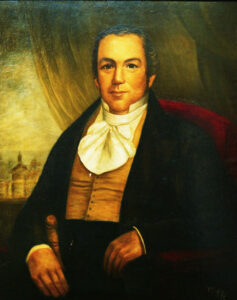calsfoundation@cals.org
A Summer’s Day
The other day, I was in my backyard, where I’m carving out a new garden plot, digging some trenches for the metal edging I was laying down. I started at 8:00 in the morning, but by only an hour in, I had already soaked through my shirt. The temperature had not yet reached 90 degrees, but the air was mercilessly still—even a slight breeze would have made it better.
By 10:00, I was a sight. The ground being dry, every stab of the pickaxe cast up a cloud of dirt, and since my clothes were drenched by my own sweat, these clouds were slowly accruing in a thin layer of mud across me. After chugging several liters of water and electrolyte drink and tea, I realized that I had to head indoors.
On days like this, I am reminded how much material and environmental conditions have shaped some of the greatest works of literature.

For example, had Shakespeare lived in Arkansas, he never would have attempted to woo a woman with the lines: “Shall I compare thee to a summer’s day? / Thou art more lovely and more temperate.” I don’t know what counted as “rough winds” in the England of Shakespeare’s day, but here they do more than just “shake the darling buds of May”—sometimes they are tracked by the local Storm Team on Doppler radar. And no Arkansan has ever said that “summer’s lease hath all too short a date.” Never.
In fact, the only thing Shakespeare says in this sonnet with which we might agree is: “Sometimes too hot the eye of heaven shines.” But that “sometimes” covers late June to late September.
Arkansas’s first territorial governor, James Miller, knew about our summers.
He left his wife back in New Hampshire when he took up his appointed duties here, and given the layers involved in formal women’s clothing at the time, that was a mercy to her indeed. In fact, Gov. Miller absented himself from the state from April to November 1821 just to avoid Arkansas’s notoriously torrid summer.
I like to think that the legislature naming the territory’s southwestern-most county after Miller was some kind of dig at him.
As Mark Christ writes in his CALS Encyclopedia of Arkansas entry on weather in the Civil War, during the Battle of Helena, the extreme heat caused many of the Confederate invaders to collapse on the battlefield before they even had a chance to retreat. But the Union forces later suffered in their own march on Little Rock, with one soldier from Minnesota writing that “the heat and dust added to the debilitated state of the system in this climate is as much as humanity can stand.”
Imagine coming from Minnesota to march around nineteenth-century eastern Arkansas from July to September. “Sometimes too hot the eye of heaven shines,” indeed.
If you think about that sonnet of Shakespeare’s as rewritten with an Arkansas summer in mind, you might get something like:
Shall I compare thee to a summer’s day?
Thou art less lovely and less temperate:
Twisters do shake the darling buds of May,
And summer’s lease hath all too long a date:
Always too hot the eye of heaven shines,
And rarely is his gold complexion dimmed;
And every tick from far will soon recline,
On legs, or nature’s bushy beard, untrimmed:
But thy eternal summer shall not fade,
Nor lose possession of that scorn I ow’st;
When Death shall brag thou wander’s in his shade
Then in eternal joy to time I’ll grow’st:
So long as men can breathe or skin can sweat
So long lives me, with my shirt soaking wet.

No, you can tell from his writing, even if you know nothing else about the man, that Shakespeare did not live in Arkansas. But Charlaine Harris set her Shakespeare series in small-town Arkansas. The Arkansas Shakespeare Theatre has put on many productions of the Bard’s work over the years. And there are a few other Bardic influences here and there.
But, if you attempting to woo someone who grew up in Arkansas, just be careful about using any lines from Shakespeare, because no matter how seductive your delivery, it won’t help your romantic cause to compare someone to a twister-ridden, mosquito-infested, sunbaked, and sunburnt part of the year.
By Guy Lancaster, editor of the CALS Encyclopedia of Arkansas



